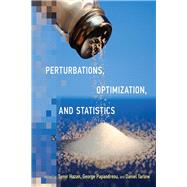In nearly all machine learning, decisions must be made given current knowledge. Surprisingly, making what is believed to be the best decision is not always the best strategy, even when learning in a supervised learning setting. An emerging body of work on learning under different rules applies perturbations to decision and learning procedures. These methods provide simple and highly efficient learning rules with improved theoretical guarantees. This book describes perturbation-based methods developed in machine learning to augment novel optimization methods with strong statistical guarantees, offering readers a state-of-the-art overview.
Chapters address recent modeling ideas that have arisen within the perturbations framework, including Perturb & MAP, herding, and the use of neural networks to map generic noise to distribution over highly structured data. They describe new learning procedures for perturbation models, including an improved EM algorithm and a learning algorithm that aims to match moments of model samples to moments of data. They discuss understanding the relation of perturbation models to their traditional counterparts, with one chapter showing that the perturbations viewpoint can lead to new algorithms in the traditional setting. And they consider perturbation-based regularization in neural networks, offering a more complete understanding of dropout and studying perturbations in the context of deep neural networks.








